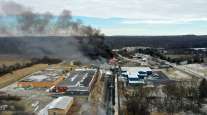Trains Slow Petroleum Shipments After Derailment

Rail shipments of crude and refined products fell last week to the lowest level since October 2013 after a derailment shut a track in Illinois for four days.
The U.S. transported 12,724 carloads of petroleum in the week of March 8-14, according to data released March 18 by the Association of American Railroads. That’s down 10% from the previous week and the lowest level for March since 2012.
Petroleum shipments by rail have fallen since last summer as plummeting crude prices have caused the biggest slowdown of oil drilling on record. BNSF Railway Co. shut its mainline near the town of Galena, Illinois, from March 5-9 after a derailment, causing delays and reroutings.
“Commodity price pressure is slowing and will continue to slow the cadence of drilling activity, and that’s one of the drivers of crude by rail being lower,” Vincent Piazza, senior energy analyst at Bloomberg Intelligence in New York, said by phone on March 18. “The derailment issues are also part of it.”
Last week’s shipments were down 25% from the peak of more than 17,000 carloads set the week of Dec. 13. Petroleum traffic on rail lines more than doubled from 2011 to last year, as booming oil production from North Dakota and Canada overwhelmed pipelines and forced shippers to look for alternative transportation methods.
Crude prices have fallen by more than half since June, causing drillers to idle more than 40% of rigs seeking oil in the U.S.
BNSF, the largest crude-by-rail shipper in the U.S., shut its mainline after a train carrying 103 cars of crude oil derailed and caught fire. The closing caused delays of up to four days and forced BNSF to reroute some trains, the company said in an online advisory March 8. BNSF can’t say for certain whether the shutdown is the cause of the lower numbers, company spokesman Mike Trevino said by e-mail.
“The effect of that line being closed for those few days meant that traffic needed to be rerouted versus having it stop and wait,” Trevino said. “If we reroute traffic, that often can have the effect of impacting transit times. And longer transit times means that less traffic gets to a destination.” Traffic on the line is now back to normal, Trevino said.
The volume of oil delivered by rail to California from North Dakota fell to zero in December, state Energy Commission data show. The state has also eliminated Canadian oil imports by train, while volumes from New Mexico and Wyoming are rising.
Tanker and barge traffic between the Pacific Northwest and California also hasn’t increased significantly, Nilofar Saidi, an oil analyst for New York-based commodities information provider ClipperData, said by phone on March 17. “It looks like refiners have been prioritizing crude by rail from closer basins,” she said.




